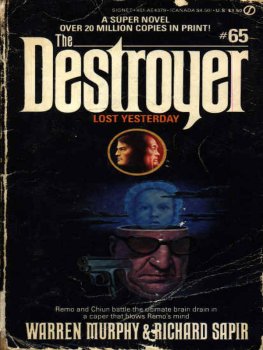***********************************************
* Title : #015 : MURDER WARD *
* Series : The Destroyer *
* Author(s) : Warren Murphy and Richard Sapir *
* Location : Gillian Archives *
***********************************************
CHAPTER ONE
Dr. Daniel Demmet was a true professional. When he decided it was time to kill his patient, he first made sure that the critical body functions were doing well. He checked the electrocardiogram screen, as he had been checking it since the patient had been wheeled into the operating room of the Robler Clinic, one of the finer hospitals just outside of Baltimore. Dr. Demmet sat on a stool behind the patient's head, from which point, as a modern anaesthesiologist, he could best supervise and protect the patient's hold on life. The surgeon, working a few feet from him, was too busy rearranging the body with instruments to worry about him. The surgeon worked on the appendix; the anaesthesiologist worked on the patient.
The screen showed normal sinus rhythm, a sharp beeping line across the screen, which caught the electrical impulses from the heart. At the first stage of trouble, the wave would become ectopic, indicating cardiac malfunction.
On the screen, death was a smooth flowing line, with little hills; life was sharp and discordant. What Dr. Demmet continuously looked at was the line that guaranteed life. Perfect. A perfect sinus rhythm. The low hill, the deep valley, the high peak, another valley, and then the pattern all over again. All this in a beep. Life.
Perfect. But then, why shouldn't it be? The patient was healthy, and Dr. Demmet had done his job well, in the best tradition of modern, balanced anaesthesia. Gone were the days when good doctors would knock out a patient with a single massive dose of a potentially lethal chemical, with the inevitable residual toxicity that left the recovering patient nauseated, uncomfortable, and, sometimes, in pain.
Now, anaesthesia is a symphony. Demmet had given the patient, a healthy, forty-five-year-old male, an initial injection of sodium pentothol, which put him quickly to sleep. The opening note.
Then oxygen through the anaesthesia machine to assure good breathing. Intravenously, the succinyl-choline, which relaxed the body muscles and made way for the endotracheal intubation, affording Dr. Demmet greater control over the patient's breathing. Then, through the anaesthesia machine, nitrous oxide, a further nerve depressant. And finally halothane. Very carefully with the halothane, for this was the basic anaesthetic of the operation.
It was also what was going to kill the patient.
Intravenously, Dr. Demmet administered a small amount of curare to relax the stomach muscles, making the appendectomy that much easier for the surgeon to perform. The electrodes of the electrocardiograph were attached to both arms and a leg. There was a constant intravenous flow of 5 percent dextrose. Dr. Demmet felt for the pulse, checked the blood pressure, listened to the heartbeat through a stethoscope, which was not of course as accurate as the electrocardiogram but still a good backup check. Then he proceeded to kill the patient.
He also did something that never appears in television dramas or great romances about hospitals but that is not at all uncommon in real operating rooms. He passed gas. Sitting on high stools for several hours, under great tension and with great need for concentration, anaesthesiologists help make operating rooms smell more like lavatories than like Marcus Welby's office. This is reality. No one ever comments, because everyone is too busy to notice.
Dr. Demmet increased the level of halothane. He did not do it with a jolt. Everything was precise. He watched the screen. Normal sinus rhythm. He increased the halothane. The ectopic response came with a flutter. Gone were the high discordant peaks. More halothane, and he watched the ectopic levelling become bigeminaltwo small beeps. A more even pattern on the EKG. Ordinarily, this pattern on the screen would have set a flurry of emergency measures into motion, but it took the anaesthesiologist to alert the team. Instead, Dr. Demmet watched the screen. Still bigeminal. The pulse lowered, blood pressure lowered, heartbeat weak and struggling. The patient needed no more halothane.
In three minutes and forty-five seconds by Demmet's watch, the screen showed a smooth, even-flowing, up-and-down line. Dr. Demmet relaxed. For the first time since the operation began, he felt the hardness of the stool. He watched the surgeon work, watched the nurse count the sponges and make sure that everything brought to the operating table remained there, not inside the patient. A sponge or a clamp left inside a patient could mean a malpractice suit, even though a sponge might not do much harm. The supervising nurse's real job was the first step in the professional web that made it almost impossible for a doctor to lose a malpractice suit. Naturally, the patient's bill showed the cost of the nurse's services.
Dr. Demmet waited another two minutes and then turned off the halothane, reduced the nitrous oxide, folded his arms, and watched the peaceful, level hills of death.
When the surgeon looked up, Demmet shook his head. "I'm sorry. We've lost him," he said.
The announcement snapped everyone's head toward the EKG screen, where the beeping dot painted the landscape of oblivion.
The surgeon glared angrily at Demmet. He would complain later that Dr. Demmet should have let him know that the patient was in trouble. And Demmet would inform the surgeon that he had done everything possible to save the patient and that if the surgeon had any complaints, he should go see Ms. Hahl, the assistant administrator of the hospital.
Now Dr. Demmet sat on the high stool, the stethoscope hanging from his neck, his ears blissfully free of any foreign objects, and watched the surgeon complete the operation down to the last suture. If no one left a sponge inside, and the nurse would see to that, then the operation was safely over, and no subsequent autopsy was ever going to reveal that the surgeon was at fault. When the surgeon left, sullenly and silently, Demmet rose from the stool, stretched his muscles and went out to break the tragic news to the next of kin. He had a reputation at the Robler Clinic of being the best at breaking this sort of news.
It is a fact of hospital life that doctors instinctively avoid dying patients and spend more time with those who are going to get well. Even now, across the nation, doctors are just beginning to study their own attitudes toward the dying, something that they have instinctively avoided for centuries, though the rest of the populace believes that they are not uncomfortable with death. Doctors are supposed to be men of great compassion, courage, and knowledge. But it is only now being admitted that a doctor often avoids telling a patient his illness is terminal, not for the patient's benefit but for his own.
Demmet, unlike his colleagues, had no such troubles. He whisked off his mask, examined his cool aquiline face for any resurgence of pimples, touched up his just-graying sandy-blond hair with his fingertips, removed his surgical gown, and went to the administrative offices to make the usual report for this special sort of operation.
"What was it this time? Heart failure?" asked a graceful young woman with dark red hair and cool brown eyes. She was Kathy Hahl, assistant administrator of the hospital and director of hospital development, another term for chief fund raiser.
"Yeah. Heart failure will do," said Demmet. "You know, the sand wedge, the damned sand wedge, is a disaster off the fairway."
"Not if you use it right. If you use it right, it's like a scalpel. Puts the ball just where you want it if you use it right," said Ms. Hahl.
"If you can play six hours a day every day," said Demmet testily.
Next page



